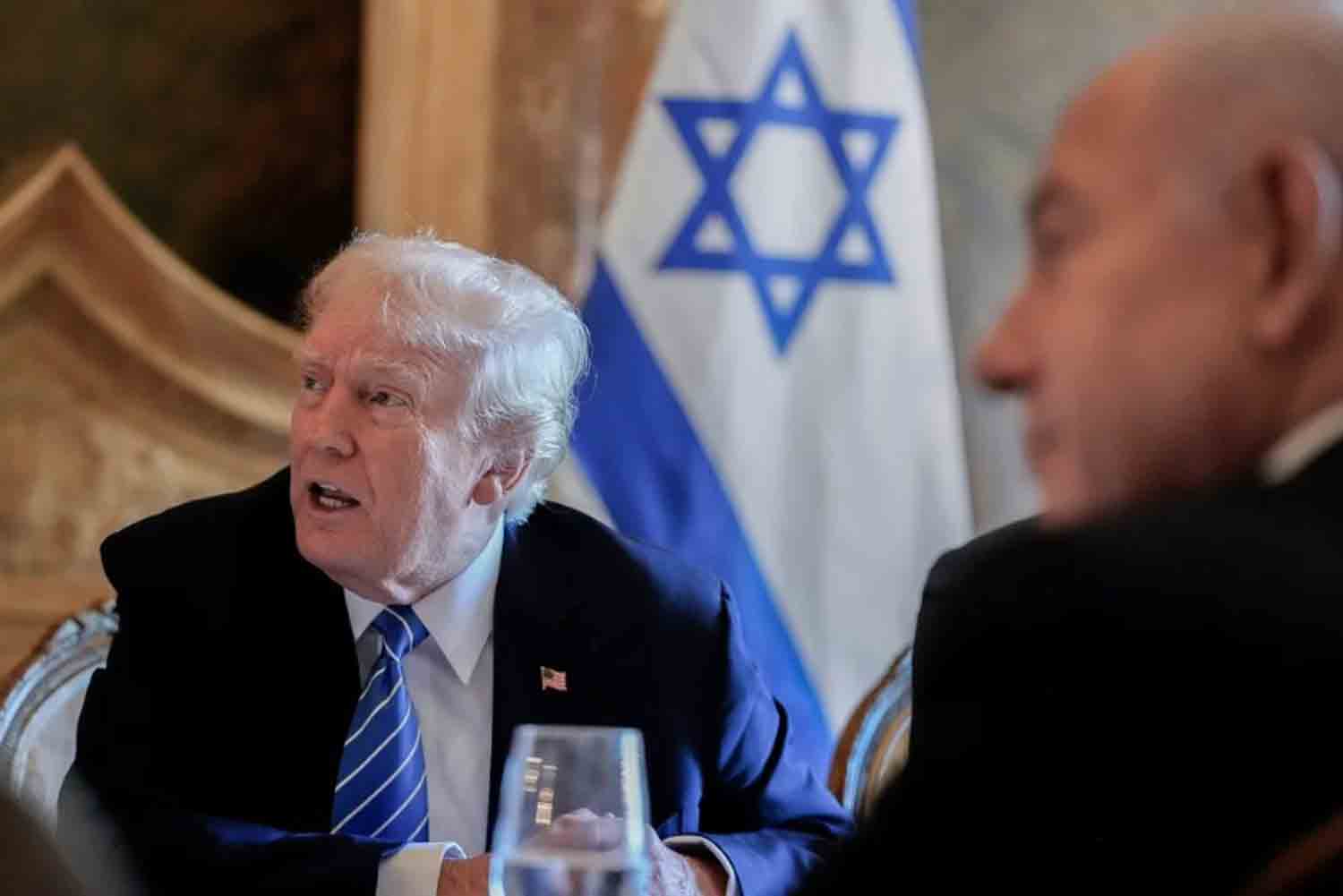There are two key considerations to keep in mind when evaluating Donald Trump’s presidencies.
Firstly, the image of a strong commander in chief is paramount.
Secondly, appearances can be deceiving.
Trump’s signature political strategy is evident in his second term, shedding light on the perplexing turmoil, brinkmanship, and theatrics surrounding his tariff conflict with Canada and Mexico.
The implementation of 25% tariffs on imports from these neighboring countries was set to begin at 12:01 a.m. ET on Tuesday. However, Trump decided to pause his dual trade war, asserting that he had achieved significant victories and concessions.
Despite the celebratory tone from the White House, a more compelling argument suggests that it was Trump who retreated from a confrontation that could have inflicted considerable economic damage.
Trump does have some grounds for boasting. He ran on a platform focused on bolstering America’s northern and southern borders, insisting that Canada and Mexico take stronger action to reduce the influx of undocumented migrants and fentanyl.
Following a conversation with President Claudia Sheinbaum on Monday, she declared her intention to deploy 10,000 Mexican troops to the border. Canadian Prime Minister Justin Trudeau agreed to appoint a fentanyl czar, establish a joint U.S.-Canada border task force, and allocate $1.3 billion for helicopters and technology to enhance security along the 49th Parallel.
“As President, it is my responsibility to ensure the safety of ALL Americans, and I am doing just that,” Trump stated on Truth Social after postponing the tariffs for 30 days to assess the outcomes of the agreements he reached with Canada and Mexico.
Pro-Trump media celebrated notable achievements. Fox News announced, “Mexico and Canada buckle,” while Breitbart News proclaimed, “Canada Caves,” asserting, “Art of the Deal: Trump has already triumphed in the trade conflict with Mexico for the USA.”
From the White House’s perspective, Trump had secured victories, employing an “America First” strategy to pressure foreign nations into compliance.
“Canada is yielding, just like Mexico,” stated White House press secretary Karoline Leavitt during an interview with CNN. This remark was particularly striking coming from a press aide lacking diplomatic duties, indicating a significant disregard for Canada, especially from a president who has suggested it should become the 51st state.
How much of Trump’s claimed ‘victories’ is genuine?
However, what did Trump actually achieve? What were the costs? And will these outcomes endure?
A more impartial assessment of the unusual confrontation with America’s neighbors reveals a harsher reality: Trump backed down.
The president had asserted just last week that Canada and Mexico could not escape the tariffs he intended to impose.
Yet, he ultimately refrained from implementing them.
As markets plummeted on Monday morning, the potential ramifications of a North American trade conflict became evident. The risk of tariffs driving up grocery prices, an issue Trump was partly elected to address, came into sharper focus. There were renewed warnings that the auto industry—a matter of cross-border significance—could face disruptions, with the cost of a new vehicle potentially increasing by $3,000.
Canada and Mexico did not concede significantly in the negotiations.
For Canada, the expense associated with a new border strategy was considerably less than the repercussions of a trade conflict, especially since they had proposed a $1.3 billion border enhancement initiative back in December. The appointment of a new “fentanyl” czar was not a significant political setback.
Mexico has repeatedly deployed troops to the border, including a deployment of 10,000 troops in April 2021 at the request of President Joe Biden, who did not need to resort to threats of economic repercussions to prompt action from its southern neighbor.
Nevertheless, Trump has reestablished his image as a bold and confrontational figure, often blurring the lines between allies and adversaries, leaving those he engages with uncertain about his next steps.
This approach resonates positively with some of Trump’s supporters back home. However, it also reinforces the perception, carried over from his previous term, that he is primarily focused on transactional outcomes, prioritizing the opportunity for significant victories over the actual substance of agreements.
More critically, the tariff confrontation has once again highlighted that the foreign policy of the world’s most powerful nation reflects Trump’s unpredictable nature.
By undermining the US-Mexico-Canada trade agreement, which he previously touted as one of the most significant deals globally during his first term, Trump has eroded trust in America’s commitments and raised concerns about his ability to negotiate future agreements. His tendency to offend the nation’s closest allies jeopardizes Western unity in the face of genuine threats from adversaries like Russia and China.
Additionally, by retreating at the last moment, the president conveyed a distinct message to Beijing—currently facing a new 10% tariff on its exports to the US—that he may be willing to pursue a deal if it appears promising, even if it lacks substantial content.
Shortly after the imposition of these tariffs, China responded with its own set of duties, set to take effect on February 10.
Trump has begun to address a critical question regarding his second term: Is he prepared to face the political consequences of the disruptive policies he claimed would usher in a new American “golden age”?
On one side, the president’s commitment to revitalizing America’s manufacturing sector, bringing jobs back from low-wage countries, and reversing globalization seems to be a sincere effort to assist Americans who have been adversely affected by the modern economy. Furthermore, he has demonstrated more substantial policy initiatives to tackle the devastating impact of fentanyl and opioid addiction than many other US leaders.
An economic shift driven by tariffs would likely entail significant short-term challenges. The recent retreat by the president on Monday indicates a lack of genuine commitment to this approach.
Canada expresses its discontent
Trump has accused Canada of not adequately addressing undocumented immigration and the influx of fentanyl across the border.
However, federal data reveals that out of the 21,889 pounds of fentanyl confiscated by US border authorities in the 2024 fiscal year, a mere 43 pounds were intercepted at the Canadian border. Additionally, of the roughly 1.6 million encounters by US Border Patrol with migrants outside of legal entry points, only 23,721, or about 1.5%, occurred at the northern border.
These troubling statistics may shed light on the inconsistent nature of the president’s statements regarding Canada. He has also claimed that the tariffs are warranted due to Canada’s failure to meet its NATO defense spending commitment of 2.0% of GDP, noting that official data indicates a spending level of only 1.37% in 2024.
Furthermore, the president has expressed frustration that US banks are unable to operate in Canada and has stated that the US does not require any of Canada’s lumber, oil, or products, suggesting a readiness for conflict on multiple fronts.
Former US Treasury Secretary Larry Summers characterized the White House’s assertions that Canada was provoking the trade war as “absurd” during an appearance on “CNN News Central.”
“Canada is our ally, Canada is not a significant source of illegal immigration, and Canada is not a major source of illegal drugs,” said Summers, who served under former Democratic President Bill Clinton. “Canada represents a vital market for American goods and is a key partner with American automotive manufacturers, allowing North America to compete effectively with Asia and Europe,” he added.
The intensity of Trump’s persistent calls for the annexation of Canada has raised concerns among Canadians. Initially, these remarks seemed absurd, but Trump’s ongoing pressure on one of America’s closest allies is starting to resemble a 19th-century imperialist approach, especially in light of his ambitions regarding Greenland and the Panama Canal.
“I would love to see Canada become our 51st state,” Trump stated on Monday. “We don’t rely on them for cars. We don’t rely on them for lumber. We don’t rely on them for anything.” He further remarked, “As a state, it’s a different scenario. As a state, it’s significantly different, and there would be no tariffs.”
Even if the trade conflict remains on hold for the next 30 days, the repercussions may linger for years.
Trump has managed to unite Canadians during a time of significant political division as Trudeau approaches the end of his term and a general election is on the horizon.
Mark Carney, the former governor of the Bank of Canada and the Bank of England, who is also a candidate for the Liberal Party leadership and potential prime minister, expressed on “Quest Means Business” on CNN International that Canada felt “offended” due to its longstanding friendship with the US. “We are a proud, independent nation. We consider ourselves the greatest country on Earth. We have faced multiple insults from senior members of the administration, and we will not respond in kind.”
Some individuals in U.S. border states with strong connections to Canada are expressing their disappointment.
“The long-term repercussions on our relationship with Canada have been profoundly damaging. The sentiments of Canadians—our closest friends, partners, and allies—have been significantly hurt,” stated former Michigan Governor James Blanchard, a Democrat, during an interview with CNN’s Phil Mattingly on Monday. “Restoring the trust and partnership with our reliable ally, Canada, will require considerable time—many months, possibly years.”
This discontent has been evident, as audiences at various NHL and NBA games in Canada have booed the U.S. National Anthem. Typically, Canadian fans often step in to sing the Star-Spangled Banner when microphone issues arise, demonstrating their goodwill towards their American counterparts.
However, due to the actions of Trump, the dynamics have shifted dramatically.
Discover more from Defence Talks | Defense News Hub, Military Updates, Security Insights
Subscribe to get the latest posts sent to your email.





